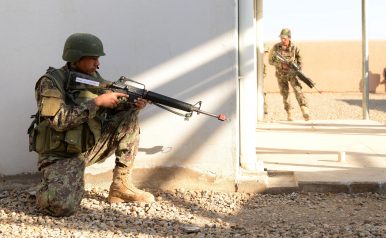By Catherine Putz
 In late December, China’s hosting of a trilateral meeting with the foreign ministers of Afghanistan and Pakistan drew headlines. “China Steps Up to Broker Peace in Afghan-Pakistan Conflict,” Bloomberg reported; “China can help bring peace to Afghanistan,” the South China Morning Post declared. Reuters highlighted China’s announcement that Afghanistan would be included into the China-Pakistan Economic Corridor (CPEC). Fewer took note of the subsequent meeting between Chinese State Councilor and Defense Minister Chang Wanquan and Afghan Minister of Defense Tariq Shah Bahrami. Bahrami also met with the Vice Chairman of China’s Central Military Commission Xu Qilian. The Diplomat’s Ankit Panda covered the meeting, noting that it “underlined the increasingly close military-to-military ties between the two countries.”
In late December, China’s hosting of a trilateral meeting with the foreign ministers of Afghanistan and Pakistan drew headlines. “China Steps Up to Broker Peace in Afghan-Pakistan Conflict,” Bloomberg reported; “China can help bring peace to Afghanistan,” the South China Morning Post declared. Reuters highlighted China’s announcement that Afghanistan would be included into the China-Pakistan Economic Corridor (CPEC). Fewer took note of the subsequent meeting between Chinese State Councilor and Defense Minister Chang Wanquan and Afghan Minister of Defense Tariq Shah Bahrami. Bahrami also met with the Vice Chairman of China’s Central Military Commission Xu Qilian. The Diplomat’s Ankit Panda covered the meeting, noting that it “underlined the increasingly close military-to-military ties between the two countries.”









